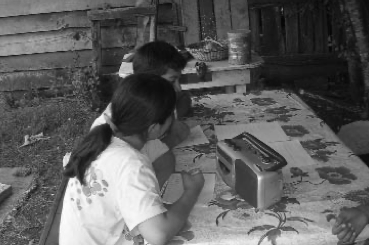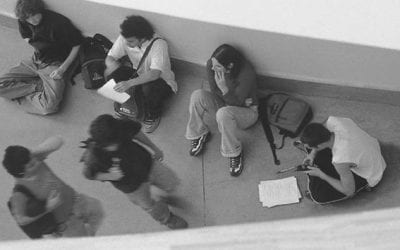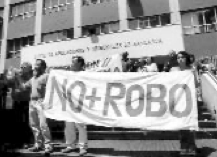Harvard in Chile
“So what’s Harvard doing in Chile?”
“So what’s Harvard doing in Chile?” is a question that I am rather often asked as program director for Harvard’s Regional Office of the David Rockefeller Center for Latin America Studies (DRCLAS) based in Santiago, Chile. There are at least three answers to this question.
“Many different things,” is the obvious first answer, especially for anyone who even quickly flips through this edition ofReVista: Harvard astronomers are studying the stars from some of the most powerful telescopes in the world atop the Andes, Harvard public health specialists are exploring lessons from Chile’s health reform, and Harvard architects and urban planners are exploring innovative designs in low-cost housing and in the process transforming the way their respective fields think about these challenges.
At the same time, Harvard College students are studying at local Chilean universities, Harvard medical students are participating in international service learning projects and doing clinical rotations, while other enterprising Harvard students are working as interns at vineyards and as volunteers at community organizations.
So the first answer focuses on the rich diversity of research, teaching or other professional activities of Harvard faculty from across the University, and study, internships and work involvement of Harvard students.
“A bold institutional experiment for Harvard University,” is a second answer. For the first time ever, Harvard University has established an office outside of the United States with a mission to serve all parts of the university—faculty, students, and administration—in promoting the work that Harvard wants to do in this region of the world (in this case, in Argentina, Bolivia, Chile, Peru, and Uruguay.) Based in Santiago, the Regional Office is designed to enhance opportunities for Harvard faculty to carry out their research and collaborative projects, as well as greatly expand the opportunities for Harvard students studying, working, or doing research in the five countries.
Harvard’s President Lawrence Summers has challenged those who work at Harvard to think about international issues, globalization, and the role of Harvard in the world.
“He has us setting our sights very high,” says DRCLAS Director John Coatsworth. “This new Regional Office represents an important institutional experiment in how Harvard is working to both make a difference in the world and to have what is happening in the world reflected back at Harvard.”
Since its August 2002 opening, the DRCLAS Regional Office has hosted more than 40 Harvard faculty members and administrators working on projects in the region, as well as organized dozens of Harvard faculty led conferences and seminars. Working closely with Harvard’s Office of International Programs, the Regional Office in Santiago administers Harvard’s only University-administered study abroad program. The Harvard College study abroad program in Chile is more than just one more opportunity for Harvard students; it is a first-time institutional experiment for the University.
“This Santiago program is a model for what we hope to see a lot more of in the future: experimentation that leads to good opportunities for our students to engage in the local culture and university life,” says Jane Edwards, the Director of Harvard’s Office of International Programs.
“I went to study in Chile because that is the one place that Harvard runs a study abroad program,” explained Melissa Dell, a junior economics concentrator currently studying in the program.
“I wanted to have access to Harvard’s resources while studying abroad,” says Manuela Zoninsein who participated in the fall 2003 program. “I liked the balance in the program. After the initial two-week Harvard orientation, I was given the independence to be a normal Chilean student. At the same time, throughout my time in Chile I had access to a great Harvard staff if the need arose.”
“Having the opportunity to study and at the same time do research at the United Nations Economic Commission that is right next door to the Harvard office was an incredible opportunity,” says junior government concentrator Lewis Smith who also participated in the fall 2003 program.
“Building bridges and creating synergies,” is a third answer to what is Harvard doing in Chile.
“Harvard’s decision to establish a formal presence in the region has had an incredible energizing impact on the local Harvard alumni,” says Harvard Club of Chile Alumni President Andrés Rodríguez. The Harvard alumni of Chile have helped dozens of students find internships and work opportunities, and have organized and hosted numerous academic conferences and seminars with Harvard faculty. The Harvard Alumni Association, Harvard Alumni Club of Chile and DRCLAS organized a reception for President Lawrence Summers on March 30, 2004 prior to a major address he gave on “Globalization and Education” at the United Nations Economic Commission for Latin America & the Caribbean (ECLAC) in Santiago.
“Making the connections to Harvard alumni in Santiago has been an enormous help to our project,” says Harvard anthropology professor Gary Urton, who has been collaborating with the Museo Chileno de Arte Precolombino in Santiago on a major exhibition and research project on the Incan khipus.
“The Harvard alumni in Chile have been invaluable in raising awareness about our work, and the current exhibition of the Incan khipus that is cosponsored by Harvard and the Museo PreColombino is one of the most successful exhibitions in the museum’s history,” says Urton’s partner in Santiago, Carlos Aldunate, Director of the Museo PreColombino.
The presence of the Regional Office has also made connections across international boundaries through initiatives such as the Bolivia-Chile-Peru Project: Exploring Opportunities for Mutual Gain.
“People solve problems better when they are able to meet face to face, without the pressure to make a commitment,” says Harvard Law School professor emeritus Roger Fisher, who has helped lead two week-long sessions for influential actors from the three countries at DRCLAS in Cambridge this past year.
“Chile and Bolivia are the only two countries in South America that do not have diplomatic relations, and there are few venues for them to explore creatively, and without commitment, new ideas in how to improve the relations,” Fisher explains. “The Bolivia-Chile-Peru project represents an important dialogue that is very difficult to organize without a third party facilitator. There is a critical role that a leading academic center like Harvard can play, and that the DRCLAS Regional Office can facilitate, in creating the space that allows leading actors from government, military, business, church, media, civil society and cultural institutions to learn about how each other sees the problem and think together about a better future. These are incredible opportunities.”
So the answers to the question, What is Harvard doing in Chile? are multiple: many things, an institutional experiment, and building bridges. But those answers raise other questions, particularly as Harvard thinks about its international strategy.
“In my view, this experiment of the DRCLAS office in Santiago has proven to be a huge success for a growing number of Harvard faculty and students, administrators and alumni,” says John Coatsworth, “but it also raises an important set of questions for the University about the future of internationalization at Harvard.”
The questions include: should Harvard continue the experiment in Chile past the initial three-year pilot phase? (There will be a full evaluation of the pilot project by the University in the summer 2004). Should the University as a whole draw lessons from the global strategy of Harvard Business School that has set up HBS offices around the world? Should the University establish a network of field offices in every major world region, each with a university-wide mandate? Should Harvard manage its own studyabroad programs in other countries, as it does in Chile?
In the end, the hope is that experiments like the DRCLAS Regional Office will help answer some of these questions by exploring, defining, and refining the ways that Harvard can have an impact in the world and bring those experiences back most successfully to the University.
Spring 2004, Volume III, Number 3
Steve Reifenberg is the Program Director for the DRCLAS Regional Office in Santiago, Chile. He served as DRCLAS Executive Director from 1996 to 2002.
Related Articles
Thinking on Children: A Literary Look at Childhood
When William Wordsworth formulated this reversal of parenting, putting children first and parents later, he followed through on a romantic inspiration about innocence being close to…
Salamanca of the Southern Cone
A few decades ago, Chile was commonly perceived as a long, earthquake-prone country in South America with a tough human rights record that made even intrepid travelers wary. Today…
Politics and Corruption
Since the beginning of Chilean redemocratization in 1989, numerous allegations of corruption in local government, the judiciary, ministries, public services and public enterprises have impacted…




